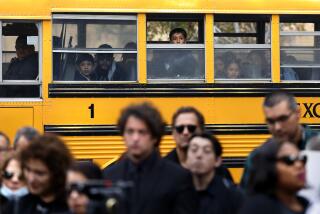Kids Learn From Peers That Smart Is Not Cool
- Share via
It’s no secret that today’s students know less than students did 25 years ago. SAT scores have declined among all groups. Many colleges have been forced to institute remedial programs for incoming freshmen.
A new study--humbling, frustrating and alarming in its implications--tells us that the reason for the decline is that kids have become less interested in being educated. School reformers will be fighting a losing battle, the study concludes, unless they focus on the out-of-school influences on students’ attitudes--disengaged parents and an increasingly influential peer culture that demeans having brains.
The power of friends is so great that even parents who have stressed academic achievement can have their lessons undone if their children are not associating with like-minded friends, researchers said.
“A large proportion of kids told us that they basically hide their intelligence because they worry their friends are going to make fun of them,” said Temple University psychologist Laurence Steinberg, one of the researchers in the 10-year project that focused on out-of-school influences on academic achievement. The researchers interviewed 20,000 students in nine high schools in California and Wisconsin. The schools were average or above average, the students from all walks of life.
One-third said they got through the school day primarily by “goofing off with their friends.” They spend an average of four hours a week on homework, compared with four hours a day spent by kids in other industrialized countries. Fewer than one in five said their friends think it is important to get good grades in school.
Choosing from among the strictly defined social cliques in high school, one-third said they wanted to be “partyers,” one-sixth “druggies” and only one in 10 wanted to be known as “brains.”
Several studies have shown that peer pressure is greatest from 7th to 9th grade and has even more importance for minority children.
Steinberg said kids tend to gravitate to “peer crowds” that are either elite (“populars” and “jocks”), alienated (“druggies” or “burnouts”) or average students who don’t distinguish themselves in any particular way. There is usually at least one group of high achievers (“brains”) and in some schools, a socially inept group of “nerds” or crowds that are defined primarily by ethnicity.
Once kids identify with a group, they internalize its standards so that they feel as if they are expressing their own identities rather than “succumbing to peer pressure,” said Steinberg, who has published the study results in a book, “Beyond the Classroom” (Simon & Schuster, 1996).
Peer pressure is not always bad, he said. Sometimes kids who gravitate to achievement-oriented groups can compensate for their parents’ disinterest.
Contrary to much popular advice, parents can indeed “manage” their children’s social relationships--and the earlier the better, Steinberg said.
They can indirectly steer their children toward “good” friends and away from “bad” friends by involving them in organized sports, youth groups or academic programs.
Steinberg cautioned parents to base their judgments of friends on behavior and actions rather than leaping to conclusions.
They can do that by getting to know their children’s friends through chauffeuring them around or making their homes inviting places to gather.
“Keeping your refrigerator stocked with Coke and ice cream is a small price to pay for the added information you’ll get as a parent,” he said.
* Lynn Smith’s column appears on Sundays. Readers may write to her at the Los Angeles Times, Life & Style, Times Mirror Square, Los Angeles, CA 90053. Please include a telephone number.
More to Read
Sign up for Essential California
The most important California stories and recommendations in your inbox every morning.
You may occasionally receive promotional content from the Los Angeles Times.













